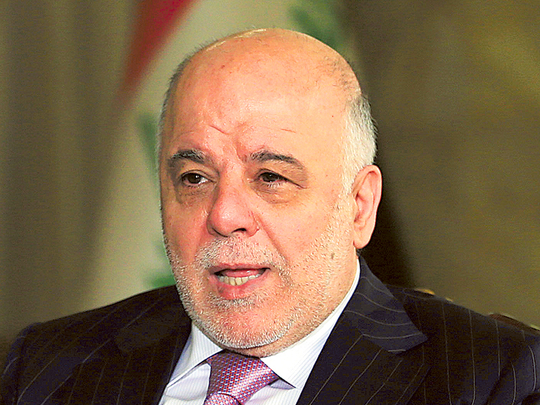
Mosul: Iraqi Prime Minister Haider Al Abadi has warned the world not to relax in fighting Daesh and the tracking of its terrorists.
He added on Tuesday that Iraq has suggested a draft resolution to the United Nations Security Council (UNSC) to pursue terrorism.Al Abadi said at a press conference after his weekly cabinet meeting that the draft resolution is aimed to prosecute terrorism and those associated and collaborated with Daesh, because “the terrorists will return to other areas in a new cover”.
Al Abadi also said that it is necessary to pursue sources of recruitment and funding of Daesh.
Al Abadi’s comments came after he officially declared Mosul’s liberation on July 10 from Daesh after nearly nine months of fierce fighting to dislodge the extremist militants from their last major stronghold in Iraq.
As for the upcoming offensive to liberate the Daesh-held town of Tal Afar, some 70 km west of Mosul, Al Abadi said “there are regular air strikes targeting Daesh militants in preparation to liberate the areas under its control, including Tal Afar.”
The offensive to free Tal Afar will be launched soon with the participation of all kinds of security forces, including the predominantly Shiite paramilitary Hashd Shaabi units and Sunni tribal fighters, according to Al Abadi.
A senior Iraqi general predicted a relatively easy victory for his forces in Tal Afar as up 2,000 Daesh fighters and their families there are “worn out and demoralised”.“I don’t expect it will be a fierce battle even though the enemy is surrounded,” Major-General Najm Al Jabbouri told Reuters in an interview.
Al Jabbouri, a key battlefield commander, said the fight would be simple compared to the nine months of gruelling urban combat in Mosul, which took a heavy toll on Iraqi forces.
“The enemy is very worn out,” said Al Jabbouri, who was mayor of Tal Afar when it was overrun by insurgents more than a decade ago.
“I know from the intelligence reports that their morale is low,” the general added.
The city, with about 200,000 residents before falling to Daesh, experienced cycles of sectarian violence between Sunnis and Shiites after the US-led invasion of Iraq in 2003 and produced some of Daesh’s most senior commanders.
It has also become the focus of a wider regional struggle for influence. Turkey, which claims affinity with Tal Afar’s predominantly ethnic Turkmen population, opposes the involvement of Shiite paramilitary groups fighting with Iraqi forces, some of which are backed by Iran.
Al Jabbouri estimated there were between 1,500 and 2,000 militants left in Tal Afar. The figure may include some family members who support them.
“It’s a large number, but the terrain is favourable (to Iraqi forces),” Al Jabbouri said.
Only one part of the city, Sarai, is comparable to Mosul’s Old City, where Iraqi troops were forced to advance on foot through narrow streets. The rest of Tal Afar can be navigated in tanks and armoured vehicles.
Unlike Mosul, where Daesh effectively held hundreds of thousands of people hostage to slow the advances of Iraqi forces, Al Jabbouri said few civilians remained in Tal Afar, except those related to the militants.
Iraqi forces expect to face bombs, snipers and booby-traps.
Despite being surrounded, there is no sign the militants are running low on ammunition, Al Jabbouri said.
Many local Turkmen members of Daesh already managed to escape by mingling with displaced civilians and fled to Turkey, where they can blend in anonymously, Al Jabbouri said.
Of the remaining militants, Al Jabbouri believed many were foreigners—from Turkey, former Soviet Republics and Southeast Asia—who became trapped after Iraqi forces severed all routes between Mosul and Tal Afar earlier this year.
The city had already been sealed off by Kurdish forces to the north, and mainly Shiite paramilitaries to the south leading to shortages of food and water.
The US-led coalition has conducted air strikes in and around Tel Afar, paving the way for Iraqi forces to storm the city after reorganising and recuperating from Mosul.
Al Jabbouri said all that remained was to receive orders from Al Abadi to launch the assault: “perhaps it will be in days, or a week, or two”.
Beyond Tal Afar, Daesh sill controls other pockets of territory in Iraq, including the town of Hawija and the surrounding area.
The upcoming battle for Tal Afar carries echoes of the past.
As the United States reduced its troop presence in northern Iraq after the invasion, Sunni insurgents seized the opportunity to take over most of Tal Afar in 2005.
Al Jabbouri, who was mayor at the time, held out in the 16th-century Ottoman citadel that used to dominate the city from a hilltop in the centre as Iraqi and American troops led by Colonel H.R. McMaster routed the insurgents.
The city stabilised, and McMaster’s approach was held up as a blueprint for successful counter-insurgency strategy, but in years to come Tal Afar lapsed back into communal violence and insurgents took root again.
Al Jabbouri says he met with McMaster, who is now US National Security Adviser, around one month ago and they discussed Tal Afar.
“It was different,” said Al Jabbouri, comparing the past battle with the future one.
Daesh is more formidable an enemy than Al Qaida was, he said, but Iraqi forces have also gained experience over three years of fighting the group.
The US. role is less conspicuous this time, and the historic citadel is no longer standing because Daesh blew it up.












